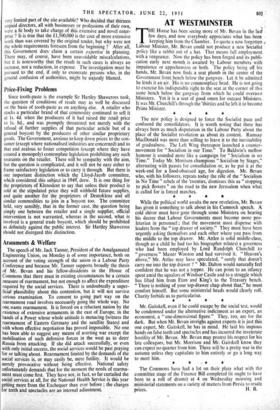Price-Fixing Problems
Since tooth-paste is the example Sir Hartley Shawcross took, the question of conditions of resale may as well be discussed on the basis of tooth-paste as on anything else.. A retailer who stocks a particular brand of that commodity continued to sell it at is. 4d. when the producers of it had raised the retail price to Is. 8d., and was promptly threatened not merely with the refusal of further supplies of that particular article but of a general boycott • by the producers of other similar proprietary goods. The Government, anxious to keep down prices to the con- sumer (except where nationalised industries are concerned) and to that end zealous to foster competition (except where they have created a monopoly) contemplate legislation prohibiting any such restraints on the retailer. There will be sympathy with the aim. but the question is complicated, and it will not be easy either to frame satisfactory legislation or to carry it through. But there is one impoftant distinction which the Lloyd-Jacob committee, which considered this subject in 1944; drew. It is one thing for the proprietors of Klenodent to say that unless their product is sold at the stipulated price they will withhold future supplies, and quite another for the proprietors of Dentoklene and all similar commodities to join in a *boycott too. The committee held, very sensibly, that in the former case, the question being simply one between the retailer and a single supplier, official intervention is not warranted, whereas in the second, what is involved is a general trade boycott, which should be prohibited as definitely against the public interest. Sir Hartley Shawcross should not disregard this distinction.


















































 Previous page
Previous page